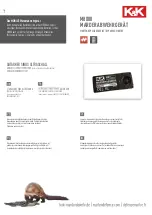
21
WARM WEATHER CONDITIONS
The following describes situations you may encounter and situations to be aware of.
Warm Weather Conditions
Since your spa will normally be expected to maintain warm to hot water ready for use, a great deal
of attention has been directed to the energy conservation detail of insulation to keep electrical cost
down. Energy conservation efficiency may be achieved by extensive insulation of the spa cabinet,
plumbing, spa shell and in some climates full foam insulation may have been provided. This
energy conservation feature may cause an inconvenience during warmer times of the year. During
warm periods of the year, the temperature within the equipment compartment can elevate to a
point that the pump will automatically turn off for a short amount of time (15-30 minutes) to allow
the pump to cool down before automatically restarting. This cool down feature will not harm your
spa, but serves only to protect the pump from damage ad as and indicator that it is too hot. To
minimize this occurrence, refrain from using your Hydrotherapy Jets for prolonged periods of time
during warm seasons. The jet pump chosen for your spa has been specifically sized for maximum
performance and your Hydrotherapy enjoyment.
Filtration System
Please refer to your Spa Manufactures Owner’s Manual regarding the operation, maintenance
and cleaning of your filtration system.
When freezing weather and/or power losses are expected, contact your local spa dealer for
freeze protection or winterizing recommendations for both the spa and the equipment system.
Freeze related damage is not covered by the warranty.
Winterizing
Chemical Water Treatment
Your dealer is familiar with local water conditions and which chemicals are compatible with and
designed specifically for your spa. This is the best person to advise you on proper water quality
management. The one thing you can do to insure years of trouble free equipment operations is to
maintain proper water chemistry.
Two basic goals of the chemical water treatment are sanitizing and balancing the water. Sanitizing
simply means keeping the water free from microorganisms including algae, bacteria and viruses.
The current most popular chemicals for sanitizing include chlorine, bromine and ozone.
Operation Considerations
IMPORTANT - Heater pump must provide a minimum flow of 23 GPM through heater.
Balancing water means establishing a balance among pH, total alkalinity and total hardness.
Water that is unbalanced can corrode the spa and it’s support equipment or leave deposits of
minerals. Properly balanced water is essential to allow the sanitizing chemical to work effectively.
There are numerous chemical additives to help you in controlling pH, total hardness and alkalinity.
Never use softened water when filling you spa. Softened water is extremely corrosive to the metal
parts of the spa equipment and may lead to an unforeseen failure. Sometimes, despite your most
diligent efforts, your water may become to far out of balance to be managed chemically. At this
point it is probably better to drain and clean the spa and start over with fresh water. Equipment
failure caused be improper water chemistry will not be covered under warranty. Saltwater
purification systems can potentially damage your equipment. Any related failures will not be
covered under warranty.








































